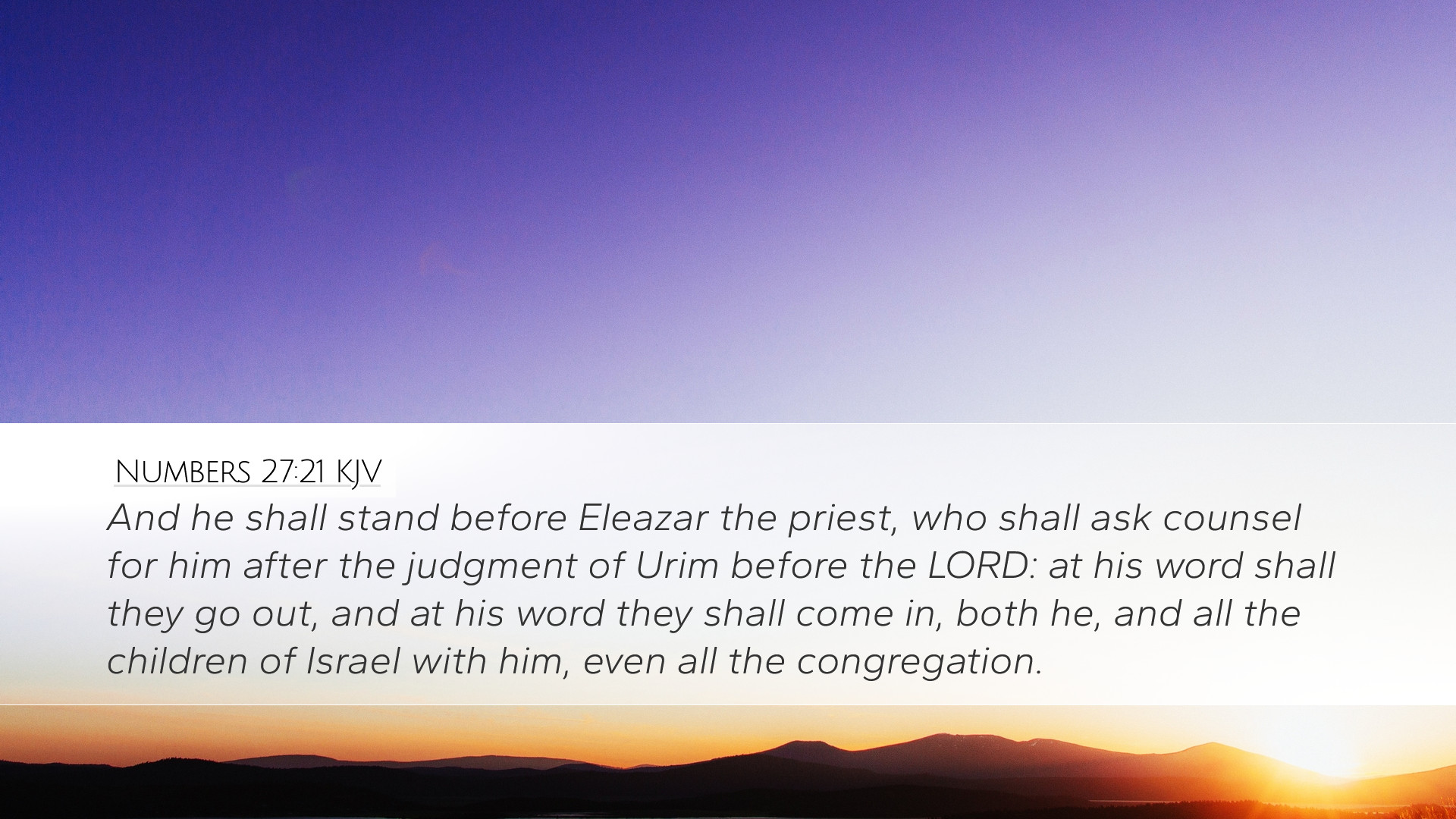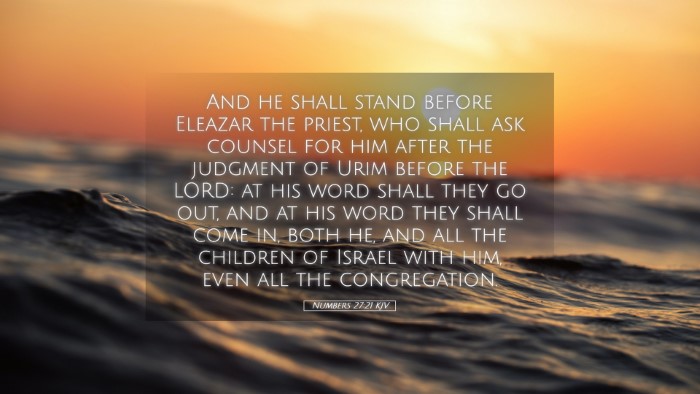Commentary on Numbers 27:21
Verse Context:
Numbers 27:21 reads: "And he shall stand before Eleazar the priest, who shall inquire for him by the judgment of Urim before the Lord: at his word shall they go out, and at his word they shall come in, both he, and all the children of Israel with him, even all the congregation."
This passage is set within a significant narrative concerning leadership and divine guidance, as it follows God's declaration about the appointment of Joshua as Moses' successor. The transition in leadership marks a pivotal moment in Israel's history, as they prepare to enter the Promised Land.
Interpretative Insights
- Leadership and Guidance: The text emphasizes the importance of spiritual leadership and dependency on God for direction. Joshua is not to lead by his own wisdom but under the priest's spiritual guidance, highlighting the synergy between civil and religious authority.
- The Role of the Priesthood: Eleazar the priest plays a crucial role in this passage by utilizing the Urim and Thummim, sacred tools for seeking divine answers. This illustrates the ongoing involvement of the priesthood in guiding Israel, affirming the significance of consulting God in decision-making.
- Divine Confirmation: The act of Eleazar inquiring for Joshua implies that God’s will must be confirmed through prayer and seeking guidance. This serves as a reminder to leaders today to pursue God’s will earnestly in their ministries.
- Community Direction: The phrase “at his word shall they go out, and at his word they shall come in” represents the unity of the community under divinely appointed leadership. It stresses the collective responsibility that the entire congregation has towards obeying God’s appointed leader.
Theological Significance
This passage reflects foundational theological principles regarding the nature of God's sovereignty and the operations of His providence through appointed leaders. The acknowledgment that the leader's decisions are under the authority of a higher spiritual power is vital for the understanding of Scriptural governance.
Comments by Matthew Henry
Matthew Henry notes that this but one part of God’s command to Moses about appointing Joshua. He reflects on the necessity of divine guidance in leadership transitions and stresses that it is through the priest’s intercession that the people of Israel would know the will of God. This underscores the integral relationship between the church and state as well as between clergy and laity.
Insights from Albert Barnes
Albert Barnes expounds on the use of the Urim and Thummim, explaining how this method served as a means of divine communication. He highlights that while Joshua was a skilled warrior and experienced leader, his competence required divine sanction, reinforcing that human leadership must be aligned with God's purposes.
Reflections by Adam Clarke
Adam Clarke provides further depth by suggesting that the phrase "at his word shall they go out" indicates a complete reliance and trust in God's chosen leader. Clarke elucidates that the people’s responsiveness to their leader's direction is a reflection of their faith in God. He sees this as an essential principle that remains relevant for us today, reminding us that following God often means following those He has put in authority over us.
Practical Applications
- Emphasizing Prayerful Decision-Making: Leaders today should prioritize seeking God's wisdom in their decisions, utilizing prayer as a first response rather than a last resort.
- Encouraging Spiritual Accountability: The interplay between leadership and priestly consultation can serve as a model for contemporary church governance, calling leaders to act in humility and accountability.
- Promoting Unity in Leadership: The collective obedience and unity expected from the congregation towards their leader exemplifies the role of the church as a body working together under Christ's headship.
Conclusion
The message in Numbers 27:21 extends beyond its historical context, offering profound insights into the nature of God’s relationship with His people through appointed leadership. As we reflect on this verse, pastors, students, theologians, and Bible scholars are invited to consider how the principles of divine guidance, community involvement, and faithful following apply in current practice. It is a call to ensure that all leadership is rooted firmly in a submissive relationship with God, leading to a harmonious and faithful congregation.


